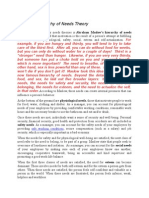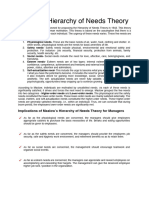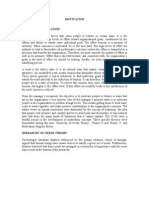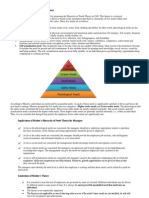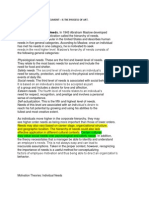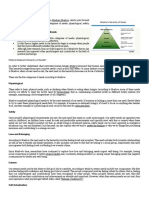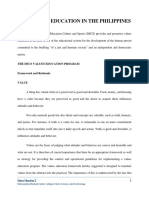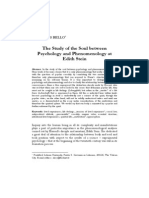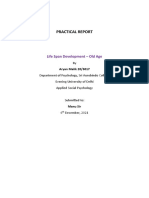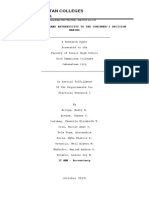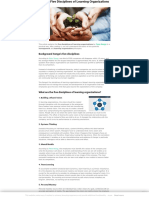Muhammad Haider Farooq.
Reg no: 70111952.
Psychology
Assignment 1.
Maslow's Hierarchy of Needs Theory
One of the most popular needs theories is Abraham Maslow's hierarchy of needs
theory. Maslow proposed that motivation is the result of a person's attempt at
fulfilling five basic needs: physiological, safety, social, esteem and self-
actualization. According to Maslow, these needs can create internal pressures
that can influence a person's behavior.
Physiological needs are those needs required for human survival such as air,
food, water, shelter, clothing and sleep. As a manager, you can account for the
physiological needs of your employees by providing comfortable working
conditions, reasonable work hours and the necessary breaks to use the bathroom
and eat and/or drink.
Safety needs include those needs that provide a person with a sense of security
and well-being. Personal security, financial security, good health and protection
from accidents, harm and their adverse effects are all included in safety needs.
As a manager, you can account for the safety needs of your employees by
providing safe working conditions, secure compensation (such as a salary) and
job security, which is especially important in a bad economy.
Social needs, also called love and belonging, refer to the need to feel a sense of
belonging and acceptance. Social needs are important to humans so that they do
not feel alone, isolated and depressed. Friendships, family and intimacy all work
to fulfill social needs. As a manager, you can account for the social needs of
your employees by making sure each of your employees know one another,
encouraging cooperative teamwork, being an accessible and kind supervisor and
promoting a good work-life balance.
Esteem needs refer to the need for self-esteem and respect, with self-respect
being slightly more important than gaining respect and admiration from others.
As a manager, you can account for the esteem needs of your employees by
offering praise and recognition when the employee does well, and offering
�promotions and additional responsibility to reflect your belief that they are a
valued employee.
Self-actualization needs describe a person's need to reach his or her full
potential. The need to become what one is capable of is something that is highly
personal. While I might have the need to be a good parent, you might have the
need to hold an executive-level position within your organization. Because this
need is individualized, as a manager, you can account for this need by providing
challenging work, inviting employees to participate in decision-making and
giving them flexibility and autonomy in their jobs.
As the name of the theory indicates, Maslow believed that these needs exist in a
hierarchical order. This progression principle suggests that lower-level needs
must be met before higher-level needs. The deficit principle claims that once a
need is satisfied, it is no longer a motivator because an individual will take
action only to satisfy unmet needs. If you look at this pyramid you can see how
Maslow's needs are organized with basic physiological needs, such as air, food,
water and sleep, at the bottom and the idea of self-actualization, or when a
person reaches the full potential in life, at the top. Again, according to Maslow,
before a person can take action to satisfy a need at any level on this pyramid the
needs below it must already be satisfied.


